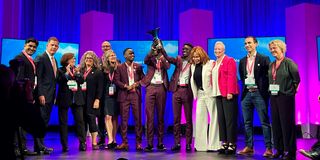Kenya holds pride of place among countries affected by period poverty

St Paul's University students (From 5th right) Brian Ndung'u, Lennox Omondi and Shiltone Dulla who won $1 million global award at the Hult Platform competition, at the Clinton Global Initiative in New York City, US last September. They produce biodegradable and re-usable sanitary towels out of banana fibre, code named Eco-Bana.
What you need to know:
- Global estimates show that half a billion women face period poverty every month.
- Many girls and women can’t afford sanitary pads forcing them into using unhygienic alternatives such as leaves, old clothes and pieces of foam mattress.
- Many girls also miss school as a result of fear of embarrassment from soiling their clothes and being teased by boys.
The lack of menstrual management products for girls and women due to financial constraints is known as period poverty. Global estimates show that half a billion women face this problem every month. Kenya holds pride of place among countries affected.
When five students of won $1 million global award at the Hult Platform competition in September, the ordinary Kenyan was impressed by the size of the prize, yet what should have, is the potential impact of the winning idea to women and girls.
Lennox Omondi, Keylie Ogola, Dullah Shiltone, Brian Ndung'u and Emmanuel Omondi convinced the competition that producing biodegradable and re-usable sanitary towels out of banana fibre, code named Eco-Bana, was the best idea in the competition. They formed a company in 2020, and gradually crystallised the idea that earned them global fame.
As they go through the motions of rolling it out large scale, it is pertinent to mull over issues around period poverty.
To begin with, many girls and women can’t afford sanitary pads for monthly management of menstruation. This forces them into using unhygienic alternatives such as leaves, old clothes and pieces of foam mattress. These are not only crude, but can also cause infections.
Extort sex
In desperation, many girls resort to transactional sex in exchange for the products. This is not only degrading, it also exposes them to violence, sexual servitude and risk of sexually transmitted infections. The whole relationship is that of a power game where lascivious men, able to provide the pads, extort sex. The mercy of such clients.
Many girls also miss school as a result of fear of embarrassment from soiling their clothes and being teased by boys. Even if they do not, they lack the confidence to participate fully in physical activities in the absence of assurance that their dignity is intact.
Moreover, that menses is a monthly routine, means they must have a recurrent budget hence, a steady and reliable source of income.
A 2016 study established that many traditional communities restrict activities of girls and women in menses, limiting their mobility and economic activity. It noted that menstruation is given scant attention in the school curriculum. Penetration of the government programme is low hence, its impact is minimal, with supply concentrated in urban and suburban localities, leaving out remote places.
Grant-funded initiatives addressing the problem are not sustainable because they subject to donor idiosyncrasies. Such initiatives also tend to be opportunistic and limited in geographical scope.
Typical challenges
During the 2022 presidential campaigns, the Kenya Kwanza coalition promised to supply free sanitary towels in all schools. That is not an entirely new idea as it is etched in the Basic Education (Amendment) Act No 17 of 2017 and has been running as a government programme, albeit with typical challenges characteristic of public services. One problematic assumption in the programme is that only girls in public schools require pads.
The truth, however, is that many more girls and women do, especially in deprived regions. The proliferation of charities addressing the problem is perhaps a perfect indicator of the programme’s performance, although sanitary pads constitute a low hanging fruit for these organisations.
Needless to say, sanitary pads are a permanent agenda on county woman representatives action plans under the National Government Affirmative Action Fund.
The promise of Eco-Bana should, therefore, lie in the following premises - the raw material should be abundantly available and affordable to make the final products as cheap as iodised salt.
Financial headache
Counties famous for banana production should already consider this an economic opportunity. That these products are washable and re-usable should eradicate the perennial financial headache and that of instant access whenever menses occur.
Given that Eco-bana is not the first re-usable brand of pads in the market, the proprietors must avoid the mistakes that have made earlier ones flop. The notable one is over-pricing, justified by the initial costs to ensure textural strength for washability and to presumptively ring-fence income that would be lost from reduction in repeat buyers over time. Thus Eco-Bana has to ensure that its products are within the financial reach of the people who need them most.
If Eco-Bana cracks this nut, it will have solved a massive social problem, the philosophy behind the Hult Platform, which congregates students of higher of learning, globally, to present viable business ideas that can address public challenges.
Thus the sooner Eco-Bana rolls out from production lines, and the more visible, accessible and user-friendly it is, the better, so we can finally see the back of period poverty.
Dr Miruka is an international gender and development consultant and scholar ([email protected]





